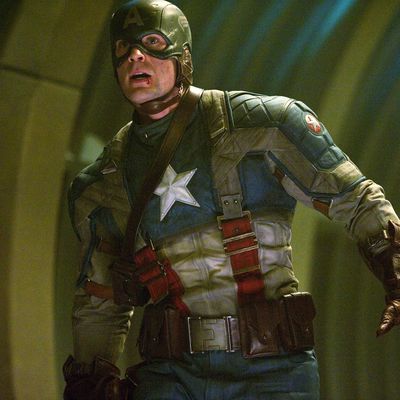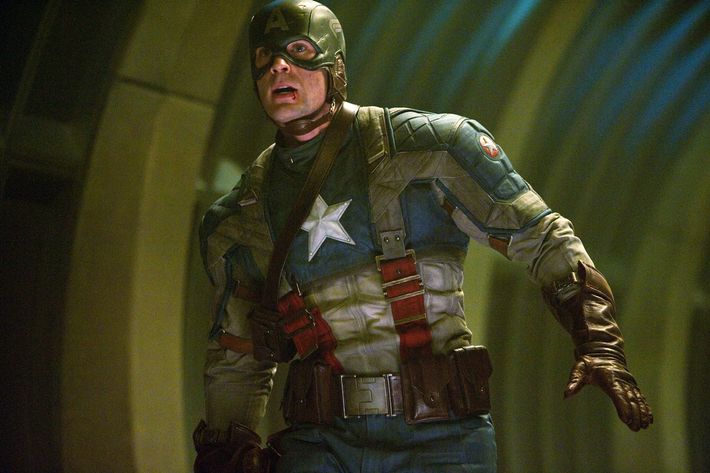

Until the computer-generated effects bog it down and mess up its rhythms, Captain America: The First Avenger, has a measured, classical pace and a lot of good, old-fashioned craftsmanship. The director, Joe Johnston, did special effects for Raiders of the Lost Ark and made such graphically strong fantasies as Honey, I Shrunk the Kids, The Rocketeer, and Jurassic Park III, and he obviously learned from Steven Spielberg to make every composition read and never to waste a shot. The movie looks wonderful. The production design by the great Rick Heinrichs is bold and unfussy, the palette monochromatic with splashes of comic-book greens and reds, and the compositions evocative of World War II newsreels and propaganda (Allied and Axis) without ever slipping into camp. Heinrichs mixes up architecture styles — Expressionist, futurist, Deco — into frames that might have leaped from the collective unconscious of forties moviegoers. The score by Alan Silvestri is a marvelous pastiche with a life of its own, and there’s a terrific song-and-dance montage in which the newly christened Captain America is trotted out alongside leggy chorines to raise the warring nation’s patriotic spirits: It’s both satirical and exhilarating.
The story? It’s all right, nothing special. The musclebound Captain America with his mighty shield, né Steve Rogers, actually was the first avenger, conceived in 1940 by Joe Simon and Jack Kirby to do battle with Hitler — earning the publisher threats from a then-large American pro-German faction. Rogers begins life not as a typical jock but a 98-pound weakling, and, for the movie, the beefy Chris Evans has his head grafted via computer onto a punier actor’s frame. It’s the best effect in the picture — mostly because it doesn’t look like an effect. Rogers’s scrawniness is just exaggerated enough to make you roll your eyes and giggle as he tries, over and over, to enlist in the Army despite a firm 4F classification. Then he’s spied by Dr. Erskine (Stanley Tucci), a German scientist who defected to the Allies and thinks Steve, despite his asthma and pitiful muscle tone, has the strength of heart to become the first biochemically enhanced U.S. soldier — putting him at odds with Tommy Lee Jones’s Colonel Phillips, who’d like a manly man for this momentous experiment.
This first half of Captain America is much better. Jones, all acid deadpan, bickers with a shining-eyed Tucci (the Einsteinian Cher-man accent adds to his lovableness) while we gleefully anticipate little Steve’s transformation into a big deal. I thought I even caught a whiff of one of my favorite films, Preston Sturges’s Hail the Conquering Hero, which also centers on a 4F who dreams of fighting in World War II — but doesn’t have a scientist to pump him full of supersizing chemicals. It’s too bad Chris Evans doesn’t have Eddie Bracken’s gusto: Once he gets into his own body he becomes a non-entity. Evans isn’t physically inventive enough to get laughs out of this nerd’s surprise and then elation with his new abilities — or make you see what luscious British agent Peggy Carter (Hayley Atwell), all dark curls and red lipstick, sees in him beyond those impressive pecs. This would have been a good role for a hunk with an antic spark, like Ryan Reynolds — stuck, alas, with the Green Lantern.
The supervillain isn’t Hitler but a breakaway Nazi psycho named Schmidt who was the first recipient of an Erskine serum — which transformed his head into a red skull. (Or was it the supernatural glowy cube zealously guarded by Norwegians? It’s a bit of a jumble.) As Schmidt, Hugo Weaving is icy perfection and gets to play most of his scenes with Toby Jones, spot-on as always, as a German scientist increasingly squeamish about their unorthodox collaboration. But the dialogue is generic megalomaniac stuff, and when the fighting begins the movie feels even more by-the-numbers. We keep waiting for the bravura mighty-shield set-piece — in which, say, Captain America wittily plays the angles like a billiards champion — that never comes. Goldfinger’s Oddjob did far more amazing things with his bowler.
The retro-nostalgic Captain America is still miles ahead of its recent competitors and helps to put the Marvel avengers in perspective. Early scenes at a World’s Fair (featuring Iron Man’s dad, Howard Stark, played by Dominic Cooper) remind you of the impulse behind the thirties superhero mythos, the mixture of patriotism, Utopianism, and hucksterism — the belief that scientists, capitalists, the military, and nerdy messianic dreamers could come together to free the world from evil. Okay, that didn’t work out so well. But Captain America suggests how grand it once was to have faith.


